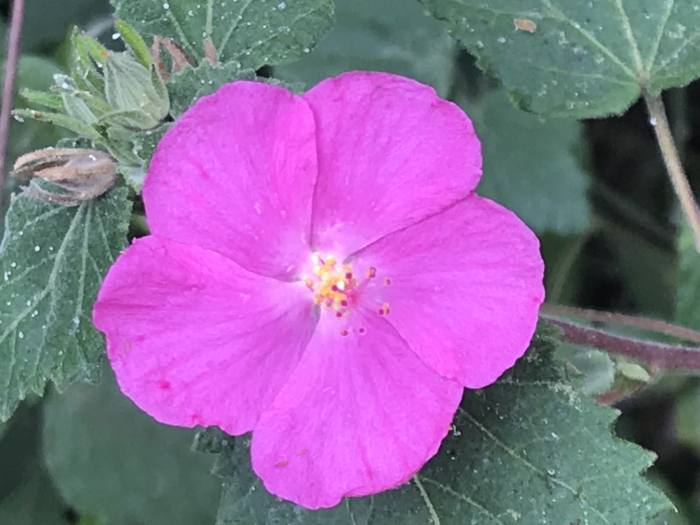Rock Rose
(Pavonia lasiopetala)
Rock Rose (Pavonia lasiopetala)
/
/

Adriana Nelly Correa Sandoval
CC BY 4.0
Image By:
Adriana Nelly Correa Sandoval
Recorded By:
Copyright:
CC BY 4.0
Copyright Notice:
Photo by: Adriana Nelly Correa Sandoval | License Type: CC BY 4.0 | License URL: http://creativecommons.org/licenses/by/4.0/ | Rights Holder: Adriana Nelly Correa Sandoval | Publisher: iNaturalist | Date Created: 2019-04-29T12:22:25-07:00 |


















































Estimated Native Range
Summary
Pavonia lasiopetala, commonly known as Rock Rose, is a deciduous subshrub or shrub native to limestone outcrops, rocky hillsides, and open woodlands in the South-Central United States and Northern Mexico. It typically grows up to 4 feet tall and wide, with a bushy habit. The leaves are ovate to lanceolate, with toothed or lobed edges, measuring up to 2.5 inches long, and have a slightly hairy texture. The hibiscus-like flowers are a showy feature, with five red or pink petals surrounding a prominent central staminal column. They bloom from June until fall, attracting hummingbirds and other pollinators.
Rock Rose is valued for its drought tolerance and its ability to thrive in challenging conditions, making it a suitable choice for xeriscaping and low-water gardens. Its long blooming period and vibrant flowers make it a popular ornamental plant for borders, rock gardens, and naturalistic plantings. It is also used as a ground cover due to its sprawling habit. Rock Rose prefers full sun to part shade and is adaptable to a variety of soil types, provided they have good drainage. While it requires low amounts of water once established, it can tolerate occasional watering during prolonged dry spells. Gardeners should be aware that it can self-seed and become weedy if not managed.CC BY-SA 4.0
Rock Rose is valued for its drought tolerance and its ability to thrive in challenging conditions, making it a suitable choice for xeriscaping and low-water gardens. Its long blooming period and vibrant flowers make it a popular ornamental plant for borders, rock gardens, and naturalistic plantings. It is also used as a ground cover due to its sprawling habit. Rock Rose prefers full sun to part shade and is adaptable to a variety of soil types, provided they have good drainage. While it requires low amounts of water once established, it can tolerate occasional watering during prolonged dry spells. Gardeners should be aware that it can self-seed and become weedy if not managed.CC BY-SA 4.0
Plant Description
- Plant Type: Shrub
- Height: 3-4 feet
- Width: 1-2 feet
- Growth Rate: Moderate
- Flower Color: Pink
- Flowering Season: Spring, Summer, Fall
- Leaf Retention: Deciduous
Growth Requirements
- Sun: Full Sun, Part Shade
- Water: Low
- Drainage: Medium
Common Uses
Bee Garden, Bird Garden, Border Plant, Butterfly Garden, Deer Resistant, Drought Tolerant, Fire Resistant, Groundcover, Hummingbird Garden, Low Maintenance, Rock Garden, Showy Flowers, Street Planting
Natural Habitat
Native to limestone outcrops, rocky hillsides, and open woodlands
Other Names
Common Names: Wright’s Pavonia , Texas Swamp-Mallow , Texas-Mallow , Wright Pavonia , Texas Swamp Mallow , Rose Pavonia
Scientific Names: Pavonia lasiopetala , Pavonia wrightii , Malache lasiopetala , Malache wrightii
GBIF Accepted Name: Pavonia lasiopetala Scheele